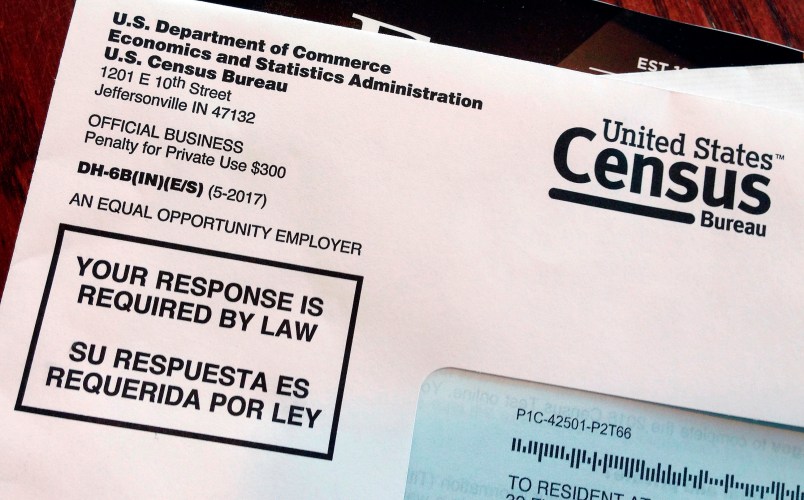A federal judge wants to reconsider his ruling that the Trump administration’s move to add the census citizenship question was not racially discriminatory, now that the challengers in the case have put forward explosive new evidence that suggests it was.
U.S. District Judge George Hazel, who presided over the census citizenship case brought in Maryland, issued an order Wednesday that said that the challengers raised a “substantial issue” with the new evidence. It will ultimately be up to the 4th U.S. Circuit Court of Appeals, where the case has been appealed, to decide whether to send the case back to him so that he can consider changing his ruling in light of the new evidence.
Hazel order is the latest dramatic turn in what has been an extraordinary legal fight over Commerce Secretary Wilbur Ross’ decision to add the question. It sets the stage for a scenario where the Department of Justice and the question’s legal challengers are still hashing it out over whether the question is discriminatory, even after the Supreme Court rules on other aspects of the question’s legality.
Whether it stays on the census has incredible consequences for how political power, as well as government resources, are doled out across the country. A broad spectrum of experts, including the Census Bureau itself, has warned it will discourage immigrant participation, causing an undercount of those communities. Furthermore, the new evidence, and other evidence already in the case, strongly point to a plan to use the data from the question to exclude noncitizens altogether from the redistricting count. Such an overhaul would greatly diminish the representation Latinos and other immigrant groups get in government, while further shifting the electoral advantage to Republicans.
It is unclear how the Hazel’s move could affect the Supreme Court’s own consideration of whether the citizenship question can stay on the census. The high court is expected to decide that issue soon in a separate legal challenge brought against the question in New York.
The Justice Department, in a hearing in front of Hazel Tuesday, suggested the Supreme Court could address the claim that the question violated the Constitution’s equal protection clause, by being discriminatory towards minorities, when the justices hand down their decision on the broader issue in the days to come. However, Hazel indicated he believed that equal protection claim could be still a live issue after that, given that it was not in New York census case that the court was reviewing and that it was unlikely that the appeals court would resolve it by the end of this month.
The challengers said at Tuesday’s hearing that if the Supreme Court blocked the question from being added to the census, the dispute over whether it was discriminatory would be moot.
The new evidence being put forward by the challengers were in files found on the back-up hard drives of a now-deceased GOP gerrymandering guru. The files suggested he was more involved in the Trump’s administration’s census change than originally thought. Among them was also a secret study the consultant, Thomas Hofeller, did in 2015 that said adding a citizenship question to the census would be necessary for the GOP to overhaul redistricting in a way that would boost Republicans and non-Hispanic whites to the detriment of Democrats.
Hazel’s order Wednesday was brief and did not say what next steps would be taken if the appeals court sent the case back down to him. He indicated he will issue a longer opinion explaining his decision at a later date.
Hazel had previously ruled that the administration’s move to add the question violated administrative law and was also a violation of the Constitution’s Enumeration Clause, because it would harm the accuracy of the census. The administration had appealed those two findings, while one of the groups challenging the question in Maryland had appealed his ruling that the question was not a violation of the equal protection clause.
“Judge Hazel’s ruling is a confirmation that the evidence we have submitted raises a substantial question as to the intentionally discriminatory actions of this administration,” said Denise Hulett, an attorney with group MALDEF, which challenged the question. “The evidence shows an undeniable conspiracy between this administration and others outside the government to jeopardize the accuracy of the census for partisan gain at the expense of Latinos and non citizens of color.”







Withholding evidence from a judge is another form of obstruction.
Does anyone think the citizenship question will NOT be on the 2020 census when all is said and done?
Trying to stay optimistic
I am sure the right wingers on the SC are aware of all the new information that has come out after they agreed to hear the case. If they rule that the question can remain, it will be quite clear that they will let the Repukes do whatever they want to do, regardless of civil rights, the Constitution, or anything else. Maybe Roberts does not want to go that far – it will give the Dems plenty of justification to appoint several new justices, assuming the POTUS is a Dem and they control the Senate. I don’t have a good feeling about it and we need to consider what to do in response, like not answering the question or not filling out a census form if you are in a red district.
Good! Judges are supposed to be judicious.